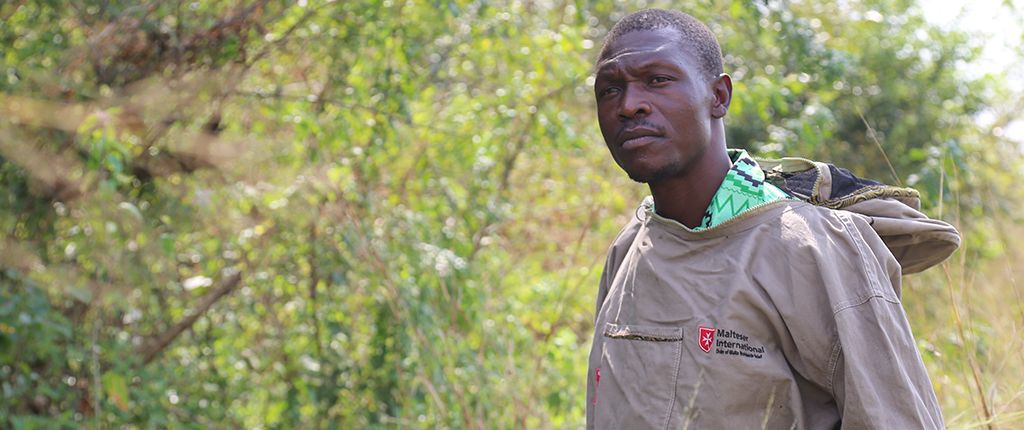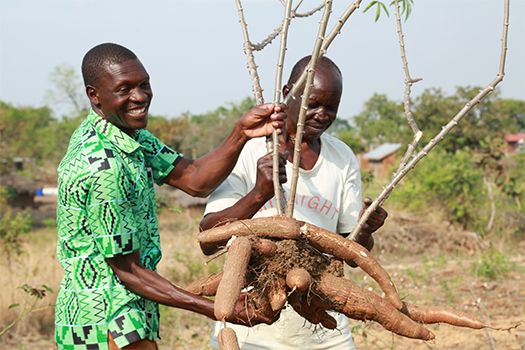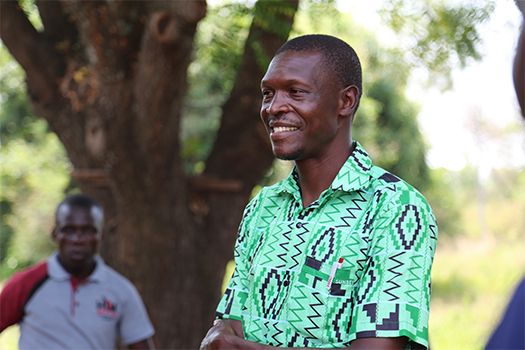
Seizing opportunities in Rhino Refugee Camp – cultivating resilience through farming

In Rhino Refugee Camp in Northwestern Uganda, Martin Lokolo, a 39-year-old South Sudanese refugee, stands as a beacon for what it means to embody ambition against trying odds. He is the Chairman of the Dynamic Group, which he co-founded to bring hope to a community suffering from various traumas as a result of a decades’ long war in South Sudan.
Fleeing the turmoil of South Sudan in 2016, Martin arrived at the camp bearing the weight of isolation and trauma—a plight common among his fellow refugees. Driven by a desire for change, he initiated the Dynamic Drama Group which comprised just two members. Their mission was simple: to try and mend some of the wounds of their community through the uniting powers of traditional South Sudanese music, dance, and drama.
As the group flourished, it grew into a community of 83 members. With a vision for more impact, in 2018, they evolved into the Dynamic Action for Peace and Rehabilitation group, embracing a newfound commitment to structure and purpose. Martin states “I was a young entrepreneur in South Sudan, and I have brought that with me.” It was with this mindset that he envisioned a brighter future for the group as they made the settlement their home.
Agricultural Support and Environmental Stewardship – working with Malteser International
Acknowledging the transformative power of collective action, the group, under Martin’s leadership, ventured into other activities, key amongst them - agriculture. This move wasn't merely about survival; it was about fostering dignity, economic empowerment, and a renewed sense of purpose. At a pivotal moment in 2022, Malteser International, in collaboration with The Victim Relief Alliance (TVRA), recognized the group's potential for growth.
With the creation of a subgroup, the Dynamic Bee Farmers comprising 30 members, this partnership embarked on a mission to train the group members in bee keeping, and subsequently equip them with bee hives. The overall goal of the MI and TVRA project was twofold: to protect natural resources across the Madi-Okollo and Terego districts through the planting of 150,000 trees, and thereafter to enhance the livelihoods, through beekeeping, of the farmers that had engaged in environmental conservation practices. In total 4,000 beehives were distributed to 108 farmers across five groups, along with essential protective gear, laying the groundwork for a thriving beekeeping venture. With Martin at the helm of the Dynamic group, it is unsurprising that they were prepared when this opportunity arose.
Today, for the Dynamic Bee Farmers group 63 hives flourish, with an additional 57 awaiting colonization by bees. The hives yield biannual honey harvests that not only signify the group’s success in beekeeping but have also enabled them to diversify their agricultural endeavors. Profits from honey sales have been reinvested into acquiring 3 acres of land for cassava cultivation. Their journey into cassava farming is not just about cultivation; it's a commitment to environmental sustainability, community empowerment, and economic resilience. The cassava plantings were distributed to the group through the partnership between MI and TVRA, and Martin expresses his immense satisfaction at receiving a variety of cassava that is extremely resilient against the oftentimes harsh weather conditions in the area. Plans to add storage facilities and a processing mill underscore the group’s commitment to value addition and sustainability.
Sharing Success and Fostering Community Growth

Martin's ambition stretches far beyond individual success. He envisions a future where the community at large shares in the fruits of their labor. "Joining in groups brings progress," Martin asserts, emphasizing the importance of collective action and mutual support. His strategy involves distributing cassava not only as food but as cuttings for planting, encouraging a culture of sharing and sustainability. In addition to their agricultural activities, the group has also formed a savings group that meets every Sunday to deposit proceeds from their earnings. The savings are distributed in December, and have already had a big impact on the lives of members who have been able to start other small businesses and provide for their families.
Martin's entrepreneurial spirit and dedication to community empowerment have become a source of inspiration. He advocates for active engagement and personal responsibility, believing firmly in the potential of each individual to contribute to the collective wellbeing.
The project is supported by Aktion Deutschland Hilft and the Alfred Neven DuMont Foundation.








